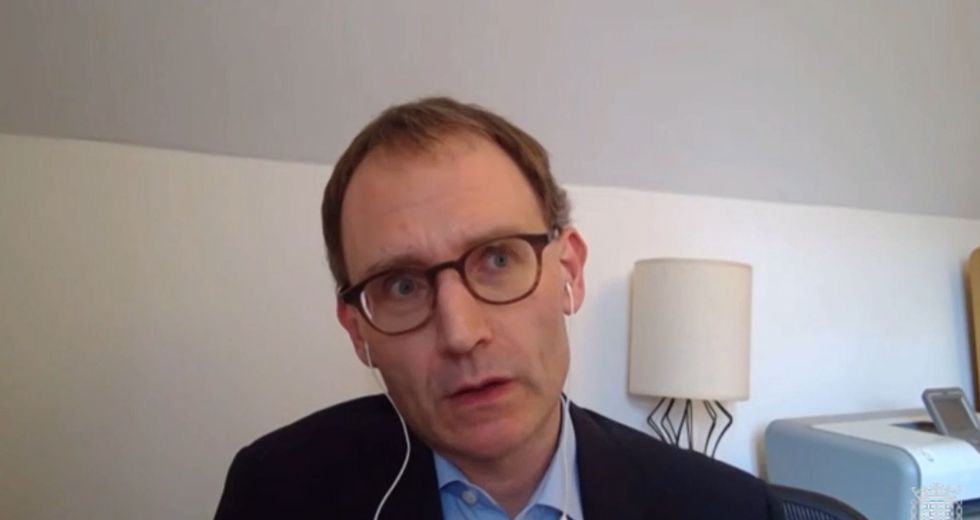Too early to say if Covid restrictions are coming back says Neil Ferguson

Professor Neil Ferguson, of Imperial College London, speaking by video link to the House of Lords Science and Technology Committee.
Parliament TV

A “significant surge” in cases is expected in the UK but it is too early to say whether that might mean the relaxation of restrictions needs to be rolled back, a leading expert has said.
Professor Neil Ferguson, whose modelling was instrumental to the UK going into lockdown in March 2020, said if daily cases start going above 100,000 to 150,000 there will be “significant demands on the health system”.
The scientist, from Imperial College London, and a member of the Scientific Advisory Group for Emergencies, said it will be for the Government to decide on potential measures and would not be drawn on what form they might take.
Speaking to reporters during a webinar on Thursday, he said there are concerns about the effect schools reopening could have on virus spread, especially with the more transmissible and now-dominant Delta variant.
He said: “We expect to see quite a significant surge in cases, to some extent in hospitalisations, but whether that’s going to require any rolling back of the relaxation of restrictions is too early to say. It really depends on the level of healthcare demand.”
He said if an unvaccinated population of 5 or 10% all got Covid in a short period of time it would result in a “large healthcare burden, and a large number of deaths” and that it could also “have a risk of significantly overwhelming health systems even in high income countries such as the UK”.
He said it is hard to predict how long any rise in case numbers, as seen in Scotland after schools went back, would go on for.
He said: “Obviously the relationship between case numbers and hospitalisations has changed now, fundamentally because of vaccination. So we can cope with much higher numbers of cases per day and still maintain hospitalisations at, well, the Government would say acceptable levels, and deaths would be even lower, but that only holds for so long.
“So if we do get above 100,000/150,000 cases a day, then we start seeing very significant demands on the health system, and it will be up to the Government to decide at that point, or at some maybe earlier point, what the implications are for policy.
“I’m not going to get drawn on what that might be.”
On Wednesday, the Government said there had been a further 35,693 lab-confirmed Covid-19 cases in the UK.
The figures followed a bank holiday weekend when there is usually a lag in reporting deaths and cases.
Meanwhile, new daily symptomatic cases of the virus in the UK were up 10% on last week, according to the Zoe Covid study with King’s College London (KCL).
They estimated there are currently 57,158 new daily symptomatic cases in the UK on average, based on test data from up to five days ago, an increase from 51,961 new daily cases last week.
Researchers estimated that in the double-jabbed population there are currently 17,342 new daily symptomatic cases in the UK.
They said cases in this group have been rising steadily for the last week and now make up 30% of all new daily cases.
On average 1 in 90 people in the UK currently have symptomatic Covid, they added.
Professor Tim Spector, lead scientist on the study and professor of genetic epidemiology at KCL, said: “The UK has enjoyed a restriction-free summer unlike most of Europe and even though a large majority of UK adults are now vaccinated, the rise in cases, as well as hospitalisations and deaths is one of the highest in Europe.
“This is evidence that without at least some restrictions Covid will continue to spread.
“Fully vaccinated people are getting Covid, but not only are they often unable to spot the signs of infection due to the Government’s outdated list of symptoms, we’ve seen evidence that the protection provided by vaccines is wearing off.”
He advised people to be responsible in trying to stop the spread by wearing masks, particularly in crowded places, good handwashing and social distancing where possible.
The latest Test and Trace figures showed the number of people testing positive in England has fallen slightly.
A total of 198,626 people tested positive for the virus at least once in the week to August 25, down 1% on the previous week.
The number of people testing positive has been around 200,000 in the five most recent weeks of data.